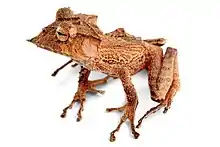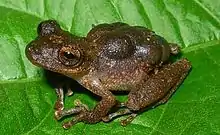| Hemiphractidae | |
|---|---|
 | |
| Hemiphractus bubalus | |
| Scientific classification | |
| Domain: | Eukaryota |
| Kingdom: | Animalia |
| Phylum: | Chordata |
| Class: | Amphibia |
| Order: | Anura |
| Superfamily: | Hyloidea |
| Family: | Hemiphractidae Peters, 1862 |
| Type genus | |
| Hemiphractus Wagler, 1828 | |
| Genera | |
|
6, see text | |
The Hemiphractidae are a family of frogs from South and Central America. Previously, this group had been classified as a subfamily (Hemiphractinae) under family Hylidae. More recent research classifies these genera into their own family, or sometimes into three separate families: Amphignathodontidae (Flectonotus and Gastrotheca), Cryptobatrachidae (Cryptobatrachus and Stefania), and Hemiphractidae (Hemiphractus and Fritziana). An active question still exists as to which of these groupings is more accurate.[1]
Breeding behavior

An unusual and unique adaptation in this family is the breeding behavior where the eggs are carried on the female's back; the eggs may develop into froglets on the back of the female without free-swimming tadpole stage, be released after hatching as tadpoles, or be deposited in water to complete their development there. In some species (genus Gastrotheca and some Flectonotus), this goes as far as to enclose the eggs in a pouch until they hatch. Males in amplexus have been observed to play an active role in placing the eggs on the back or in the pouch of the female. In some species, froglets may stay on the female's back after hatching.[2][3]
Taxonomy
The Hemiphractidae are divided into these genera:[1]
- Cryptobatrachus — backpack frogs
- Flectonotus — Brazilian treefrogs
- Fritziana
- Gastrotheca — marsupial frogs
- Hemiphractus — horned treefrogs
- Stefania — carrying frogs
References
- 1 2 Frost, Darrel R. (2013). "Hemiphractidae Peters, 1862". Amphibian Species of the World 5.6, an Online Reference. American Museum of Natural History. Retrieved 10 January 2014.
- ↑ Means, D. Bruce; William E. Duellman; Valerie C. Clark (2008). "Ovipositing behavior in the egg-brooding frog Stefania ayangannae (Anura, Hemiphractidae)". Phyllomedusa. 7 (2): 143–148. doi:10.11606/issn.2316-9079.v7i2p143-148.
- ↑ "Hemiphractidae". AmphibiaWeb: Information on amphibian biology and conservation. [web application]. Berkeley, California: AmphibiaWeb. 2013. Retrieved 10 January 2014.